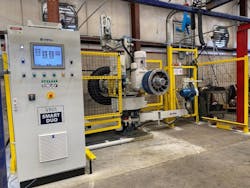Longtime tread rubber supplier Vipal Rubber Corp. is now in the retread machinery business. Earlier this year, the company's Vipal Machinery division installed a second machine at Pete's Road Service's truck tire retread plant in Corona, Calif., and is pursuing business with other North America-based retreaders.
MTD recently caught up with Gabriel Fuma, commercial manager for Vipal's NAFTA region, to discuss Vipal Machinery's plans. (The company already sells retread plant equipment in its native Brazil, as well as Argentina, El Salvador, Uruguay, Spain and New Zealand.)
MTD: Vipal has been a supplier of tread rubber, cement, envelopes, cushion gum and other retreading components for many years and is now bringing retread plant equipment to North America. Why are you expanding into North America and why now?
Fuma: North America is strategic for Vipal, both in terms of its retreading products and now equipment produced by the company. Vipal sees the United States as one of its main markets and understands the importance of it as the world's largest (market) for retreading. This is seen by the infrastructure that Vipal aims to establish to serve this region. There are three (Vipal) distribution centers in the U.S.: Los Angeles, Calif.; Miami, Fla.; and Norfolk, Va. In order to meet the growth of exports to the North American market, the company has dedicated one of its four factories exclusively for export.
Therefore, the business done by Vipal in the U.S. symbolized an excellent opportunity for growth. We believe that our equipment will add the most value in this market.
MTD: What opportunities does Vipal see for its equipment in North America?
Fuma: Having our equipment in North America is very promising. Tire retreading in the U.S. is a reference for the whole world, as it is the largest in volume sales and where the biggest players are found. In addition, Vipal has ... distribution centers in strategic locations throughout the country. In this context, the entry of our machines on U.S. soil symbolizes a new step for us, especially considering the size of our customers.
MTD: Does Vipal design and manufacture all of its retread plant equipment and machines or are they built by a third party?
Fuma: All Vipal Machinery equipment is 100% produced by the company itself. We employ our own engineering in all the technical and technological capacity that Vipal has gained over its more than 47 years in the industry. This gives us the conditions to continue betting on the expansion of our equipment and business portfolio in the global market.
The main objective of Vipal Machinery is to bring state-of-the-art technology to our partners - offering them resource optimization, whether in terms of energy, manpower or improvement in physical space utilization.
MTD: Vipal Machinery has already sold machines to some U.S.-based retreaders, most recently Pete's Road Service in California. Can you describe how Vipal made in-roads with Pete's? What sold Pete's on buying and installing Vipal machinery? (Editor's note: Vipal also has sold equipment to Retread Solutions, which is based in North Carolina.)
Fuma: Pete's Road Service is a business partner of Vipal and has always had a very satisfying experience (using Vipal tread rubber.) This good relationship and previous experience led the retreader to install the Vipal Smart Duo buffer in its plant in 2020. The decision to buy the machine was made by betting on its cost benefit, besides knowing they can always count on the services and technical support that Vipal offers.
After checking with quality and results obtained with the operation of this machine, they decided to buy new equipment, the VOC 760 Cargo, earlier this year. They say that there are significant gains that the equipment provides.
MTD: Vipal's decision to sell plant equipment puts it in a new "league" as a one-stop shop for not only tread rubber but also machinery. How will Vipal's U.S.-based retreaders benefit from this approach?
Fuma: After the increase in taxes on Chinese tires and a healthy economy, the (U.S. retread) segment began to return to the path of growth. U.S. retreaders are generally optimistic about the future of the market. This directly affects the investment in equipment and in the modernization of their plants.




